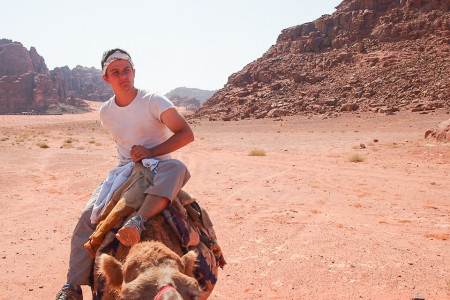
Even though Grinnell has many great opportunities to offer, lots of students can’t wait to get off campus. From Tanzania to Denmark, many Grinnellians chose to immerse themselves in a new culture through off-campus study. Dana Lindenberg ’16, Charlie Eddy ’17 and Sam Curry ’16 all jumped at the chance to gain a more global perspective by spending their fall semester abroad.
Lindenberg spent last semester in Pune, India studying at the Gokhale Institute of Politics and Economics. She was attracted by the chance to experience something completely new.
“I knew that I wanted to go somewhere that is radically different than the U.S., so I didn’t want to go to Western Europe,” she said. “And the summer before my first year at college I spent three weeks in China, so I wanted to go back to Asia and see a different part of it.”
Eddy made his way to Moscow, while Curry traveled to Amman, Jordan. Both were excited to see and do new things, even if it meant taking a risk with their academics.
“I wasn’t planning on getting any [academic] credits for it,” Curry said .
The anthropology major was much more concerned about language acquisition and experiencing a different culture. “Anywhere you go you gain a perspective on people, which is what anthropology is all about. So pretty much regardless of where I went had something to do with anthropology,” Curry said.
Complications with his program forced Eddy to take a leave of absence from Grinnell in order to participate, but his passion for theater made the art-intensive program in Moscow a worthwhile risk for the Russian major.
“I got interested in Russian because of theater. It began with Chekhov, and then the famous tradition of Stanislavski, who created a revolution with theater,” he said.
Along with his academic classes, Eddy enjoyed classes in movement, ballet and stage combat. Curry found the vigorousness of the classes different from those at Grinnell.
“The Arabic classes were challenging, but the area studies courses were super, way easier than Grinnell’s classes,” he said.
Without the strain of a rigorous schedule, both Lindenberg and Curry took advantage of their extra time by interacting with locals through internships and research.
“I worked for an organization that provides legal advocacy to underrepresented groups in Indian society,” Lindenberg said. “I traveled around and with an interpreter, conducted interviews in person and over the phone. I also did a lot of reading of the news.”
At the end of her semester, she compiled a report on excommunication within communities.
Curry’s independent research allowed him to connect his experience in the United States to his new environment.
“I did my project on water research in Jordan, and in agriculture especially because that’s to what I do back home,” he said. “I visited farms, which I wouldn’t have been able to do if I didn’t have the credentials that came with studying abroad.”
Still, there were times when all three travelers felt disconnected from their surroundings.
Eddy remembered a time when he felt out of place while attending a Russian theater production.
“I looked [behind] and saw the audience completely full of tears. And I didn’t know why they were crying because I missed something,” he said.
All eventually embraced the unknown and connected with their new homes. They hope to return in the future if they are given the opportunity.
“I definitely would, but I would need to have a concrete reason to be there, like a job,” Curry said. “I think if I was going back I would go for an extended period of time because I would really want to go there for a year to get back to the swing, to get back to what it’s like to live there.”
Eddy had a slightly different outlook while reflecting on his experience.
“It’s exciting to see a mystery unfolding and to feel so naïve. I’ve been able to crack some of the mystery,” he said.




























































